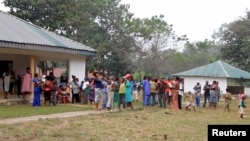Tens of thousands of people are living in the bush without humanitarian aid in Cameroon after two years of fighting between separatists and government forces that has failed to attract widespread international support, an international aid agency said Thursday.
More than half a million people have fled their homes but the crisis has yet to generate the humanitarian response that is needed, according to Jan Egeland, secretary general of the Norwegian Refugee Council, who visited the restive Southwest region this week.
“They are not able to return to their torched villages nor do they have confidence that they can go to the towns,” he said.
The English-speaking separatists in the Northwest and Southwest regions allege years of marginalization by the government of largely French-speaking Cameroon. President Paul Biya, in power since 1982, has branded the separatists as terrorists.
Hundreds have been killed as fighters from a number of armed groups battle government forces and attempt to economically paralyze the regions.
Egeland met with women who had sought refuge in the capital of Southwest region, Buea.
“They told harrowing stories of how villages have been attacked at night. Often they wouldn't know whether it was one side or the other,” he said. “Some said they thought it was government. Others said they thought it was rebels. What they have in common is that they fled with nothing.”
Civilians also have been targeted by the separatists, who have kidnapped students from schools. They also have amputated the hands of those still working on rubber plantations after a boycott was called to halt the local economy.
Egeland called on all sides to allow humanitarian organizations access to the volatile regions, and on other aid groups and European governments to step up assistance.
The Central African nation is divided along lines created during colonialism by European powers. The country now known as Cameroon was first ruled by the Germans then divided among the French and British. As a result, there are English- and French-speaking regions. English speakers are estimated at about 20 percent of the population.




